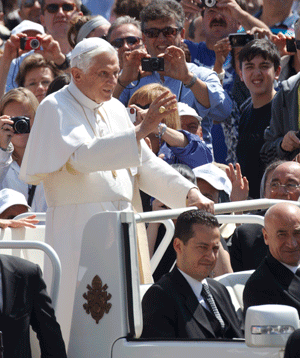VATICAN CITY (CNS) — The lawyers for Paolo Gabriele have petitioned Vatican magistrates for house arrest for their client, who is accused of illegally possessing stolen documents as part of the so-called “VatiLeaks” scandal.
Jesuit Father Federico Lombardi, Vatican spokesman, said May 30 that the magistrates who have been holding Gabriele in the offices of the Vatican police were considering the formal request to allow him to return to his Vatican apartment with his wife and three children.

The papal assistant, a combination butler and valet, was arrested May 23 by Vatican police, who said they found stolen documents in his apartment.
Father Lombardi confirmed that Gabriele’s lawyers had petitioned for house arrest. He said the magistrates were considering the request and “arrangements already are being made” in case they allow it.
The spokesman also confirmed that Msgr. Georg Ganswein, the pope’s personal secretary, confronted Gabriele about leaking documents to a journalist when suspicions began to focus on him. “It would have been strange not to ask for an explanation” when Gabriele had worked in the private papal household with Msgr. Ganswein for six years, Father Lombardi said.
In addition to the magistrates’ questioning of Gabriele, Father Lombardi said the Vatican police and a commission of cardinals appointed by Pope Benedict XVI continue to investigate the leak of private letters to Pope Benedict, encrypted cables from Vatican embassies around the world and other sensitive documents. The first documents were released by an Italian journalist in January and he published dozens of them in a book in mid-May.
Briefing reporters at the Vatican, Father Lombardi said no cardinals were being questioned in the inquiry. However, he said, “hypothetically speaking,” it is unlikely that a cardinal would be interrogated by the Vatican magistrates.
“Cardinals answer to the pope,” he said. “With anything involving a cardinal, the Holy Father would have to be informed and decide how to proceed.”
The Vatican spokesman began his briefing by highlighting the pope’s “clear and heartfelt” words during his weekly general audience that morning. The pope told an estimated 15,000 pilgrims in St. Peter’s Square that he was saddened by the VatiLeaks scandal, but he firmly believes the Holy Spirit continues to guide the church. The pope also thanked the majority of Vatican employees who work with fidelity and discretion, and he said some of the media are exaggerating their coverage, painting a false picture of the Vatican.
Father Lombardi also noted that Archbishop Angelo Becciu, the No. 3 official at the Vatican Secretariat of State, had published an article in the Vatican newspaper the evening before in which he called the leaks “an immoral act of unheard-of seriousness.”
The journalist who wrote the book claimed his sources were acting out of a concern for the pope and the church, hoping to promote transparency and an end to corruption, but Archbishop Becciu said leaking the letters was “unjustifiable behavior from every point of view.”
In addition, he said, it is “hypocrisy” to pretend to be shocked that — as some of the letters show — Vatican officials disagree over how to handle different situations and bring their concerns to the pope.
People “criticize the monarchic and absolutist nature of the church’s central government,” he said, then they turn around and act “scandalized because someone writing to the pope expresses ideas or even complaints about how that government is organized. Many of the published documents do not reveal power struggles or vendettas, but the freedom of thought which the church is criticized for not allowing.”
Archbishop Becciu said the letters show that “obedience does not mean renouncing one’s own opinions, but sincerely and fully expressing one’s point of view, then abiding by your superior’s decision.”
— By Cindy Wooden, Catholic News Service






